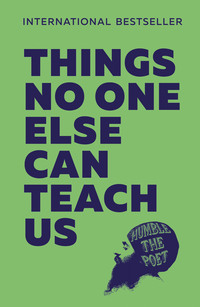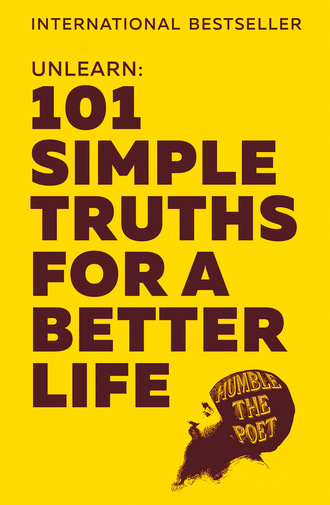
Полная версия
Unlearn

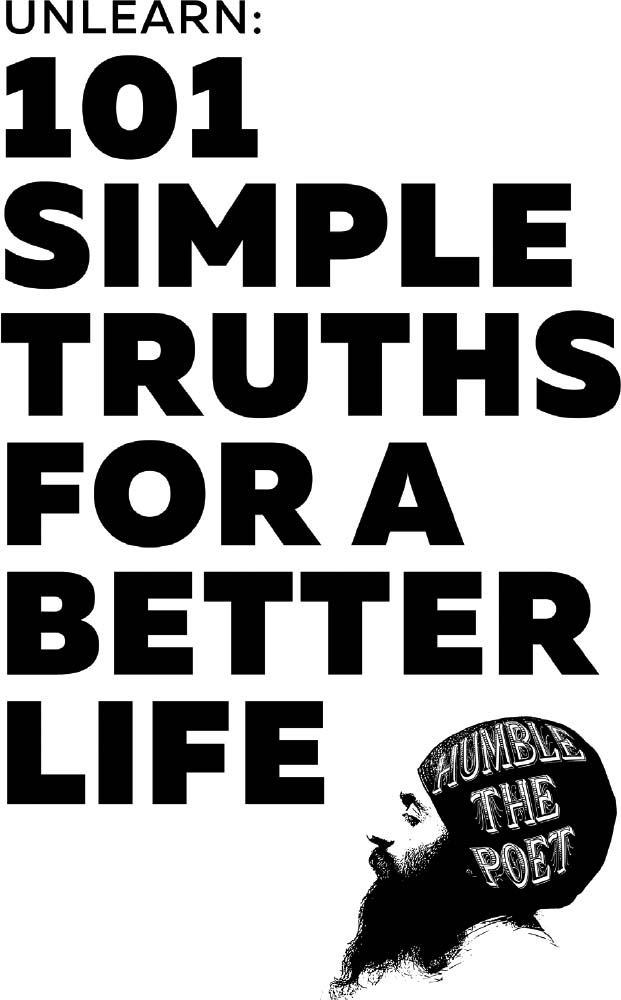

Copyright
HQ
An imprint of HarperCollinsPublishers Ltd
1 London Bridge Street
London SE1 9GF
First published in Great Britain by
HQ, an imprint of HarperCollinsPublishers Ltd 2019
First published in the United States by HarperOne, an imprint of HarperCollinsPublishers, 195 Broadway, New York, NY 10007.
Copyright © Humble the Poet 2019
Humble the Poet asserts the moral right to be identified as the author of this work.
A catalogue record for this book is available from the British Library.
All rights reserved under International and Pan-American Copyright Conventions. By payment of the required fees, you have been granted the non-exclusive, non-transferable right to access and read the text of this e-book on screen. No part of this text may be reproduced, transmitted, down-loaded, decompiled, reverse engineered, or stored in or introduced into any information storage and retrieval system, in any form or by any means, whether electronic or mechanical, now known or hereinafter invented, without the express written permission of HarperCollins.
Source ISBN: 9780008359621
Ebook Edition © 2019 ISBN: 9780008359638
Version: 2019-09-11
Epigraph
To attain knowledge,
add things every day.
To attain wisdom,
remove things every day.
—LAO TZU
CONTENTS
Cover
Title Page
Copyright
Epigraph
Introduction
Chapter 0. Why?
Chapter 1. No Straight Lines
Chapter 2. Want to Be Happier in 5 Easy Steps?
Chapter 3. Unhappiness Is Simple
Chapter 4. The Gift of Fear
Chapter 5. Golden Girls
Chapter 6. Death Trap for Dependencies
Chapter 7. We Carry a Lot Through Our Lives
Chapter 8. When Less Is More
Chapter 9. Loving a Bottomless Pit
Chapter 10. How We Spend Our Days Becomes Our Life
Chapter 11. Putting Yourself First Is Not Selfish
Chapter 12. When Was the World Fair?
Chapter 13. You’re Going to Die
Chapter 14. Who Are You?
Chapter 15. We All Have Our Stresses
Chapter 16. Pave Your Own Road—There’s Less Traffic
Chapter 17. Don’t Sabotage Yourself
Chapter 18. Time Heals All, But Not on Your Schedule
Chapter 19. A Lesson from 50 Cent
Chapter 20. You Can Be Whatever the Fuck You Want
Chapter 21. Lonely Is a Feeling, Not a Circumstance
Chapter 22. Don’t Trust Everything You Feel
Chapter 23. Things Get Overwhelming Quickly
Chapter 24. I Don’t Know You
Chapter 25. Hukam
Chapter 26. Money Is a Funny Thing
Chapter 27. A Fear Overcome Is a Strength Acquired
Chapter 28. Trust Your Wings
Chapter 29. You Have Reasons to Be Miserable
Chapter 30. Fluffy Pillows and the Truth
Chapter 31. Is It Ignorance or Apathy?
Chapter 32. Comparisons Are Killer
Chapter 33. High Expectations and Low Patience
Chapter 34. Help Those You Love the Way You Love
Chapter 35. Let’s Talk About Your Beliefs
Chapter 36. Allow Your Heart Some Character
Chapter 37. The More We Let Go, the More We Gain
Chapter 38. Heartbreaks Are Essential
Chapter 39. Another Lesson from 50 Cent
Chapter 40. People Are Expensive
Chapter 41. Sometimes We Need to Suffer
Chapter 42. Falling in Love with Learning
Chapter 43. Fewer Expectations, Fewer Disappointments
Chapter 44. Fitting in Is a Pointless Activity
Chapter 45. Ghostbusters
Chapter 46. You Can’t Save ’em All
Chapter 47. It Hurts to Care Sometimes
Chapter 48. Which Emotions Are You Feeding?
Chapter 49. You Can’t Protect Your Bubble
Chapter 50. You Have to Do What’s Best for You
Chapter 51. The Religion of “Want”
Chapter 52. Don’t Let Someone Else Write Your Story
Chapter 53. Depending on Luck Is for Suckers
Chapter 54. I Met This Girl Once …
Chapter 55. Don’t Know Yourself, Can’t Be Yourself
Chapter 56. Oh Man, How Scary It Is to Ask for Help
Chapter 57. Are You Happy?
Chapter 58. Regrets Are Stupid
Chapter 59. Nobody Fits In
Chapter 60. All My Mothers
Chapter 61. Only Boring People Get Bored
Chapter 62. One Promise of Life Is that It’s Going to End
Chapter 63. Love Is a Gift Not a Loan
Chapter 64. Self-Pity Is Self-Sabotage
Chapter 65. Worms of Validation
Chapter 66. Which Way Is Your Spiral Headed?
Chapter 67. How Do Others See You?
Chapter 68. You Decide Your Worth
Chapter 69. The Storm Is in Your Mind, Not in Your Life
Chapter 70. Put That Heart on a Leash
Chapter 71. Are You in It to Give or Receive?
Chapter 72. Fight!
Chapter 73. You Need to Forgive
Chapter 74. Labels Are Dehumanizing
Chapter 75. Celebrate Your Scars
Chapter 76. Validation Is a Helluva Drug
Chapter 77. Fake It ’til You Make It
Chapter 78. Baby Steps Add Up
Chapter 79. You Only Have So Much Time
Chapter 80. Don’t Infect Yourself with Negativity
Chapter 81. Words Are Weapons, If You Allow Them to Be
Chapter 82. You Are a Work of Art in Progress
Chapter 83. Losing a Piece of Ourselves
Chapter 84. Don’t Be Too Hard on Yourself
Chapter 85. What’s Right and Wrong?
Chapter 86. Embrace Your Challenges
Chapter 87. How Rarely They Think of Us
Chapter 88. Love and Logic Won’t Hold Hands
Chapter 89. Smile to Feel It or Conceal It?
Chapter 90. Killing Expectations Births Happiness
Chapter 91. What’s Taking Up Space in Your Life?
Chapter 92. Living the Width of Your Life
Chapter 93. The More Love You Give, the More You Get?
Chapter 94. The Only Constant
Chapter 95. No Minimums on Appreciation
Chapter 96. Who Holds the Key to Your Happiness?
Chapter 97. Starting Is the Hardest Part
Chapter 98. Don’t Hold Yourself Back
Chapter 99. Happiness Is Not a Place
Chapter 100. Some Folks Are Addicted to Misery
Chapter 101. The Most Important Chapter in This Book
Acknowledgments
About the Author
About the Publisher
INTRODUCTION
Have you ever told a six-year-old to put on their boots and snowsuit? Well, they put on the boots first and then struggle to get the snowsuit over them. When I was an elementary school teacher, I quickly realized it wasn’t always what I said to them, it was how I said it. Kids are empty vessels and sponges, and they soak in so much consciously and unconsciously, until it’s absorbed as “how things should be.” As we get older, this doesn’t change much: we continue to soak in messages, often without realizing it.
We stick to a script that hasn’t been edited in decades, and we serve as both prisoner and guard to the status quo. The thing with the script is that it comes with some big promises, both spoken and unspoken. Be a good person and good things will happen to you; show people love and they will show love to you; play by the rules and good guys will always win. Most of these ideas got reinforced by our parents, teachers, Full House, and our understandable urge to fit in.
Part of that script includes the idea that we need to be more, we need to get more attention, love, significance, Pokémon, and validation. We climb endless mountains daydreaming of how wonderful it’s going to feel once we reach the top. That feeling will be so wonderful that we won’t stop and take a minute to enjoy the view. If we play this game long enough it stops being fun.
And that’s probably why you’re here.
I didn’t write this book to write a book. I, like you, found myself lying on the floor feeling sorry for myself, betrayed, frustrated, and most importantly, powerless. My best friends were NyQuil and this muscle relaxer I still can’t pronounce. My strategy during the lowest points in my life was simple: sleep, and wait for someone else to clean this all up for me.
But the teachers were long gone, Uncle Jesse was nowhere to be found, and all I had was a broken heart, a cloudy mind, and a very comfortable bed.
Just like you, I have conversations in my head all day, and not many of those conversations during this time were pleasant. I made a lot of mistakes, and just like you, I beat myself up over and over, reliving each and every mistake, imagining a life where I could do it over, and feeling everything would have been better then. Looking back, I realized one of the biggest mistakes I made was thinking I was the only one going through this shit.
We can be in a room full of people and still feel alone. When we tell ourselves that no one understands us, it’s an easy trick for feeling connected to something; but it usually just means feeling sorry for ourselves. I was feeling sorry for myself for a long time, until I realized we’re all in the exact same boat. If we’re all in the same boat, why not connect with each other?
The moment I realized I wasn’t alone I began to share the conversations I was having with myself publicly. These conversations came from a version of myself that was trying to make sense of shattered pictures in front of him. As time went by, those conversations became a journey that allowed me to understand and gain clarity about the world inside me. That understanding also brought clarity and helped embolden my message to the world around me.
I’m not here to solve your problems. I’m here to remind you that all you’ve been doing, since the doctor smacked your butt, is solving problems, and if you want to continue facing life, the most important thing isn’t learning the new lessons you have to learn, it is unlearning the old ones we have to let go of.
Sometimes letting go is as simple as telling the six-year-olds to put their snowsuits on first and then their boots, and other times it’s taking the thick marker in your junk drawer that nobody ever uses and making massive revisions to that outdated script we’ve been taught to follow.
We can’t make those revisions if we don’t know where we want our story to head, and we can’t decide our story unless we discover and decide ourselves. This book is the sandpaper to help clear the rust from stale narratives, and the microscope to get a clearer view. This book is here to help you reconnect with what you already know. Like all of us, you’ve just been distracted by the bullshit in life. Let go of everything else. The more of this bullshit we let go, the more room we create to look inward to find things we’re authentically enthusiastic about. Discovering those things that excite us will allow us to decide where we want our life to head.
I’m a lifelong learner, and I have always been the kid in the class who likes sharing his notes. This book is a collection of those notes I took along the way. Truth will always be a hard pill to swallow, so the least we can do is to keep it simple. (Plus, teaching children taught me to keep my words short and sweet.)
I’m not one of those guys who promised himself he’d write a book one day and followed through. I’m the guy who, just like you, has no choice but to stare my struggles in the eyes and explore them before they devour me. This book is that journey. Along the way, I left teaching to pursue my creative work full-time. After many uncomfortable years, I reached success as a musician and spoken-word artist in ways I could never have predicted. I then realized my purpose extended beyond those art forms, and I explored different avenues to bring the sparks in my mind to life. I direct my own music videos and design my own clothes, and here we are reading my book. Throughout this journey, I unlearned flawed, fixed scripts and relearned incredible lessons about life, love, loss, and myself. This book won’t spare you heartbreak, anxiety, regret, or any other kind of suffering; it’ll remind you of just how important they really are. As creators, we all learn from observing, and sometimes our best teachers can be ourselves.
This shit doesn’t get easier, we just get stronger. We become wiser when we realize how much we can learn from our yesterdays, and we become lighter as we let go of old ideas, beliefs, and values that serve no value to our future. This has been our story since the beginning of time. Along the ride, so many things piled up to make it more difficult, but sometimes all we have to do to keep it moving is let go.
Thank you for being a part of this journey with me. Since first publishing this book myself in 2014, it’s gotten so many people around the world tangled in my beard, and has connected us in ways I could never imagine. The most valuable thing isn’t the money you (or the person you stole this from) spent on the book, it is the time you’ve invested in reading it. Because what you’re doing is investing in yourself, and I appreciate being a part of that with my heart.
Thank you for connecting.
Kanwer Singh
@humblethepoet

The journey of my life is no different from the journey of anyone else on this planet. There have been brilliant moments and moments that still make me cringe when I think about them. I’m haunted by my past and worried about my future just as much as anyone else. I’m confident that I’m not the only one going through the peaks and valleys of life. The realization that I’m not alone allows me to understand how normal these things really are. We tend to amplify our problems and sink into a center-of-the-world mentality, thinking that the entire universe is conspiring against us; it’s not.
We all have conversations with ourselves: in the shower, on the way to work, late at night—sleepless in bed. I took these conversations and just started typing and sharing them with the people in my life who wanted to hear them. If you’re reading this, that includes you.
Loneliness can be a horrid feeling, and it’s amazing how quickly it can dissipate when we realize how much we have in common with other folks; ironically, the room is full of folks who feel alone. The remedy I found that works best to combat this feeling is to simply connect with others.
I’m an observer and a creator. This means I simply try to pay attention and restate what I’ve learned in the way I understood it. I worked as an elementary school teacher for over half a decade, and those experiences taught me to keep my communications short and sweet. Information in small chunks is easier to absorb. That’s what this book is—a collection of nuggets to remind you of the things that keep this wild ride steady. I use the word remind because we have all had our flashes of brilliance and greatness throughout life, and whether or not we knew it, the mindsets we had during those moments can be applied to our challenges today, to help us overcome them.
I appreciate the time you’ve taken to check this out and hope you enjoy my work as much as I enjoyed writing it. Please soak in what you like, disregard what you don’t, and share whatever you feel someone else needs to hear.

There aren’t very many straight lines in nature, and that includes your life. When reading through this book, the first thing I want you to let go of is the idea of a straight line. You’re going to come to points in this book where you stop and say, “Didn’t he already say that?” The answer is, “YES!” Anything worth saying is worth repeating. It’s rare that we come across something worthwhile in life, and a single encounter is enough for it to stay with us. This book was written as much more of a cycle than simply having a beginning, middle, and end.
Ideas need to be reinforced and revisited to settle themselves into us. These days, information is being taken in at such a rate that it’s forgotten before the page is even turned (assuming people still turn pages). Any skill worth having requires practice, and practice is simply repetition over and over until it becomes second nature.
There’s very little order in this book; you can read it backwards, start from the middle, or read every other chapter; the content here only has value when it connects with you. What you read at fifteen will have a completely different relevance when you’re twenty-five. I hope you decide to revisit these writings and build new connections with the ideas as your own journey continues.
The thoughts and ideas presented are nothing revolutionary. They’ve been around for thousands of years, and most of this wisdom already exists within us—we just need to shed some of the other things the world has put on top. We gain more from letting go; there’s nothing mystical or secretive about this idea. This book is meant to agree with and bring out the wisdom you already possess.
No matter the shape of your life and journey, I hope this book makes the trip a bit more enjoyable.
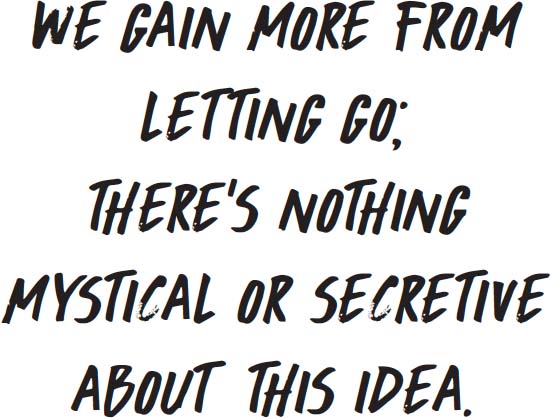

Just send $19.99 to … I’m kidding.
Write down five things in your life that you’re grateful for, or write ten.
A simple shift in what your mind is paying attention to can do wonders for the way you feel. It’s not a trick, it’s not a gimmick, it’s respecting the fact that happiness is a mindset, so SET YOUR MIND TO HAPPINESS BY THINKING OF HAPPY SHIT.
It doesn’t last, but is it supposed to? Does it make sense to be happy ALL the time? If you were happy all the time, would we even know what happiness was anymore?
Improve your relationship with all your emotions because there’s a lot to discover from them. I’m grateful that I have a variety of emotions. They teach me something new about myself on a regular basis.
We hide the darkness with our smiles, feel lonely in crowded rooms, and become so accustomed to these feelings that we begin to believe they’re a part of who we are.
They’re not. You won’t be the same person if you let them go, you’ll be better.
People who aren’t happy with what they have won’t be happy with what they get. This mindset can be both beneficial and burdensome. Some folks find happiness in the pursuit itself and are grateful for the opportunity.
Personally, I’m not looking to be happy all the time, nor do I want to be satisfied and content. I enjoy an ambitious hunger, and as long as I’m moving forward, learning, sharing, and growing, I’ll be grateful for every nugget that comes my way, whether it be shit or gold.
What are you grateful for?
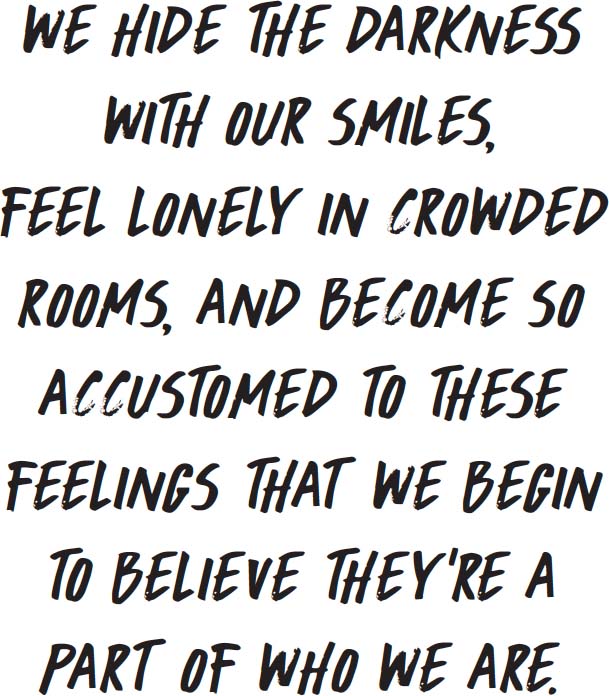

Unhappiness is simply when the picture in your head doesn’t match the picture in front of you. Some folks aren’t happy because they don’t have what they want, or they aren’t where they wish to be. Some just feel horrible about themselves. Maybe they’re comparing themselves to others, or even a former version of themselves. Either way, the simple equation is the mismatch of how you want it with how it is.
How you want it isn’t set in stone. Most of us have wanted something for a long time, and once receiving it, realize it wasn’t all that, and what we had propped up in our mind was an inflated sense of euphoria or contentment. Wanting less will definitely make you happier than getting more.
How it is isn’t set in stone either. We see what we choose. Most of the improvements I’ve made in my life this past year came from tweaking the way I saw the things that were always around me. I stopped seeing my mistakes as failures but rather as valuable (or expensive) lessons. Roadblocks became speed bumps and hurdles. Reasons to quit became reasons to adapt (or motivation to smash through).


